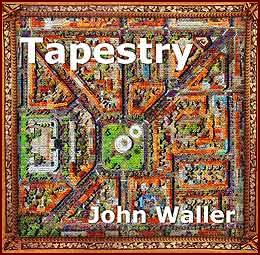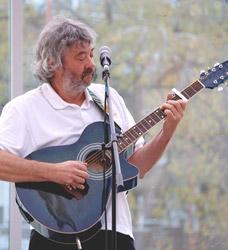Notes on the Songs Grandad 2050 (JW)
We do know. And we are not doing enough about it. And our grandchildren will not thank us. Climate changes will impact most on those least responsible for causing them; while the main perpetrators will try to insulate themselves from the consequences, a process which could be bloody. Tapestry (JW)
I have always been fascinated by “choice”, and how (or if) the various life choices we make really affect how we turn out. Choices such as where to go to University, whether to go to a particular disco, which job to apply for, do shape everything that happens thereafter: who you meet, what you do. But the sort of person you are, the type of partnership you form, the sort of job you’ll eventually be doing: these are maybe already set by factors that predate the actual choices. Writing this song enabled me to tick a surprising number of “ideas” off my song-writing list. Xiao Shan (JW)
The chorus is an adaptation of an old Chinese proverb. It is the lot of the peasant always to work with his face to the earth and back to the sky, whatever the political system. Things are changing in China; and this is a reflection. Eternal Window (JW)
A tune in 5/4. I know what the song will be that accompanies it; I even have a structure. But 5/4 is not an easy time signature to write lyrics for, so it hasn’t emerged yet. Perhaps on the next CD... Irene Nemirovsky (JW)
When I first heard the story of this “lost” manuscript for Suite Francaise, found in a suitcase 50 years after the writer Irene Nemirovsky had been transported to Auschwitz, I knew it was the basis for a “big” song. But it was another two years before I hit upon the main chord sequence that was the key to writing it. My main interest was the idea of her daughter clinging on to an icon in the hope that by doing so, she could avoid coming to terms with the inevitable. But the events that underpin the story are so momentous that they too forced their way in. I don’t know if the daughter’s motivation for not opening the suitcase was as I have described it, and I do not know whether she ever visited Auschwitz. I don’t think it matters. Listopad in Mirogoj (JW)
Listopad (literally, leaf fall) is the old Croatian word for October. Mirogoj is the big cemetery in the hills outside Zagreb. On the Day of Death everyone makes a pilgrimage to visit the family grave. I spent a “gap” year in Zagreb in 1970-71, and this song brings together some of the many images and memories from that time. One was the strong persistence of both religion and nationalism, which I naively assumed might have been muted by communism. But I was also surprised that Nataša, someone my own age, already knew exactly where she would be buried. More detailed background available here. Ulicama (JW + NH, based on original by Ralph McTell)
While in Zagreb in 1970, Nataša Hajčić and I concocted this, based on Ralph McTell’s classic. As far as I know, this remains the definitive Serbo-Croat rendition. The Italian Chapel (JW, performed by Simon Alexander)
It is a songwriter’s dream to have someone else learn and perform one of your songs. I am absolutely delighted that Simon Alexander has brought his own interpretation and distinctive guitar style (not to mention a professional recording) to this, and included it on his own fine CD Adelaide Street. Recorded by Ron Angus/Studio One; harmonica by Jim Bullock Bethesda to Rowen (JW, embellished and performed by Eileen Walker)
The same applies to Eileen Walker’s treatment of “Bethesda”; with special gratitude for her excellent additional verse and chorus, in Welsh. The gist of her extra lyric is “Leave our little town alone; our pain will come to an end. What do you know about our life here, from the gardens of Y Rowen? Pesda Roc and the young will bring our old language back to our country; you will hear the sound of our laughter and our singing before long! Yes, this is what the English will hear: the high-life is at an end: the Welsh are the owners of their lands, Bethesda and Rowen!" Anna (Al Stewart)
A beautiful song by my favourite songwriter of all time, Al Stewart. “ No, he didn’t take very much; just your flesh from the bone ...”. Even a short song can tell a whole story. Barbed Wire (Trad)
A “traditional” song from the trenches of the First World War. There are many different versions, and as many verses as there are Officer ranks above Private; plus various degrees of bawdy and/or cowardly activities they get up to. Great for joining in with at folk clubs. Dalesman’s Litany (FW Moorman)
A classic song written by FW Moorman a hundred years ago, tune by Dave Keddy more recently; chronicling the tribulations suffered by the many labourers drawn into the burgeoning Industrial Revolution towns of West Yorkshire; before factory and child labour acts, health and safety legislation or trade unions. The chorus dates from much earlier, when both Halifax and Hull were renowned for their draconian treatment of itinerant thieves; including Halifax’s guillotine, which predates the French Revolution by over a century. But there’s another song in there ... Tom Wood (Jane Clark)
This homage to Tom Wood’s Highwood Brewery, set in the Lincolnshire Wolds, was written by Jane Clark (formerly Jane Ludlam); a member of Donkey’s Breakfast, a now-defunct Lincolnshire band. Dave Robinson joins me in the chorus. All tracks written and performed by John Waller © 2008 except:
# 7: Ulicama: original by Ralph McTell, translated version by JW and Natasha Hajcic, performed by JW
# 8: The Italian Chapel: written by JW, performed by Simon Alexander (from his CD Adelaide Street)
# 9: Bethesda to Rowen: written by JW, Welsh words and performance by Eileen Walker, acc Tim Moon
# 10: Anna: written by Al Stewart, performed by JW
# 11: Barbed Wire: traditional c. 1916, performed by JW
# 12: Daleman’s Litany: words by FW Moorman, tune by Dave Keddy, performed by JW
# 13: Tom Wood: written by Jane Clark (formerly Jane Ludlam), performed by JW, acc Dave Robinson Recorded by Dave Robinson / Oak Mount Studios, except # 8 Ron Angel / Studio One; and # 9 Tim Moon Cover Design by Nicholas Waller; photograph of John Waller by Luba Kulikova
| 
